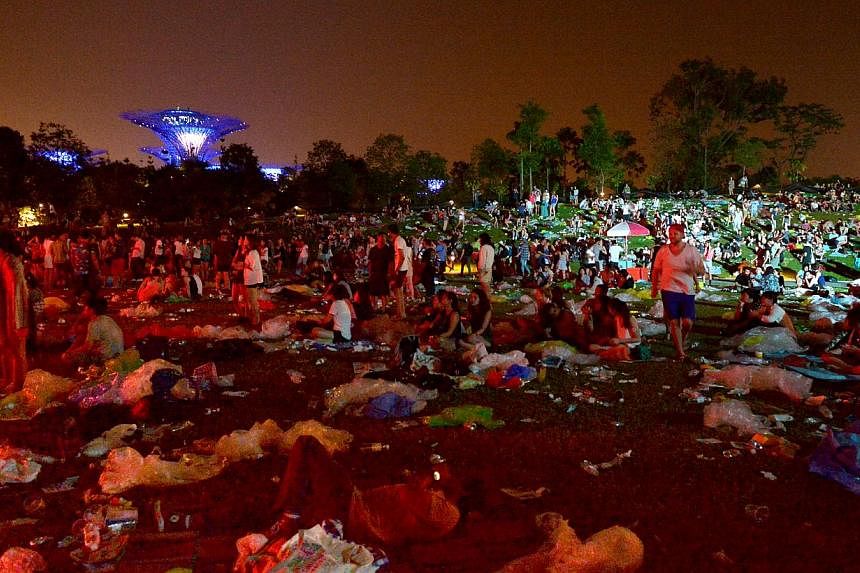Once in a while, something happens that puts the spotlight on an entire community.
When it does, you can use the opportunity to confront the truth and deal with it honestly.
Or you can look the other way or, worse, find an excuse to blame someone else.
That moment for Singapore came last month when Prime Minister Lee Hsien Loong posted a picture of the rubbish left behind after a music festival at Gardens by the Bay.
He contrasted it with another photo of football fans from Myanmar cleaning up their section of the new National Stadium after a game.
The difference was so huge you could drive a garbage truck through it.
Unfortunately, the PM's comments about the state of cleanliness in the country were criticised by some for being unfair to Singaporeans when the litter was left mostly by foreigners attending the show, or so they claimed.
It might well be true that there was a sizeable foreign crowd and that they, too, littered the grounds, but it's clearly rubbish to say Singaporeans were not responsible as well.
There is growing evidence that the littering problem has become noticeably worse, and it isn't because it's someone else's fault.
This newspaper has received letters from regular visitors who say the country is dirtier compared with how it was when they last visited.
They've written fondly of how they remembered the city years ago and described their disappointment that it hasn't kept up its reputation as one of Asia's cleanest.
When the National Environment Agency last did a major survey on the issue in 2010, 36 per cent of respondents (read: citizens) said that they would litter if they believed they wouldn't be caught.
The chairman of the Public Hygiene Council, Mr Liak Teng Lit, thinks it has become so bad, Singapore is now facing a "crisis of cleanliness".
He should know, as he participates regularly in cleaning-up activities, picking up litter in public places.
The problem isn't that Singapore isn't clean, though it might not be as spotless as it used to be.
It is that it has required an army of cleaners to keep it so - 70,000 at last count.
Remove these workers, even for a short period like after a performance in a public place, and it's clear where the problem lies.
This isn't a new issue.
In 1988, a No Sweeping Days experiment was tried in several places around the island.
Orchard Road turned out pleasantly litter-free but neighbourhoods like Bukit Merah, Upper Boon Keng Road and Chinatown were reported to have "deplorable" levels of accumulated litter.
You have to ask this uncomfortable question: Why is it that after so many years of public campaigns, enforcement action and education, Singaporeans are still not as socially conscious as, say, those in Japan, Taiwan and, even more humbling, Myanmar?
Why, despite being one of the most educated and economically advanced nations in Asia, do so many Singaporeans not pick up after themselves?
It's interesting to read some of the comments following the PM's post, because it says a fair bit about what people think the issue is.
Here is a sampling of some of the more interesting views:
- Schools should do more to develop the right values and not be concerned only about academic achievements.
Those who made this point recalled their own school days when cleaning was part of their routine and wondered if it was still carried out today.
(Answer: Many schools say they do but I am not sure how seriously teachers and students view it.)
- Too many Singaporeans are brought up in households with maids who do all the cleaning.
- Singapore is a society that looks down on cleaners who are among the most poorly paid.
As a result, children grow up thinking cleaning up is beneath them and is a job done only by these lowly regarded workers.
All these might be valid points and help explain why the problem persists.
But there is one other reason which quite a few people have pointed out, and it is about ownership and responsibility.
When you care enough to keep your surroundings clean, it isn't just about cleanliness.
It's about community, and about caring for the other members who share the same space.
In societies that exhibit a high level of civic consciousness, it is the regard and consideration for fellow citizens that drive and shape people's social behaviour.
So here's an even more uncomfortable question: Is the larger problem not one of cleanliness, but of Singaporeans' sense of belonging, which is weaker than in other societies?
Littering is merely a symptom of this more serious issue.
How do we strengthen this sense of community?
Perhaps it's not possible to rush these things, not even in a jubilee year, and Singapore will eventually get there in the fullness of time.
But a good start would be to acknowledge the problem and recognise that social behaviour is shaped by deeds, not by words (read: not another campaign).
You have to constantly practise doing good to become good.
Greek philosopher Aristotle put it this way: "We acquire virtues by exercising them. People become builders by building, musicians by playing instruments... they become just by performing just acts, temperate by performing temperate ones, brave by performing brave ones."
Going by this piece of ancient wisdom, you have to constantly practise being a good citizen - actively keeping public spaces clean, volunteering your services, advocating causes for the public good and participating in civic activities.
So, here's a simple suggestion to speed up the process.
Do away with paid cleaners in schools and make students responsible for cleaning them.
It's not enough to set aside one day in the school week to do so: Students have to know that if they don't clean their schools, no one else will.
That's how it is done in Taiwanese and Japanese schools, and you see the result in their societies.
They have had plenty of practice.
Dare Singapore schools take up this challenge?


